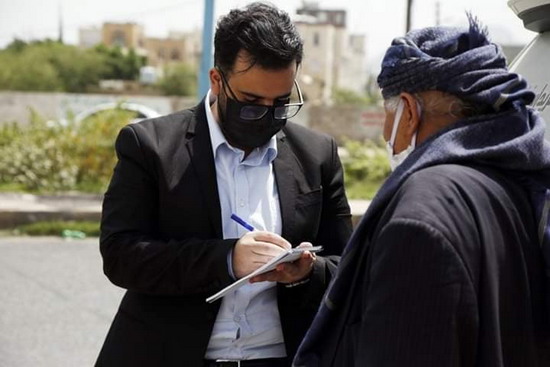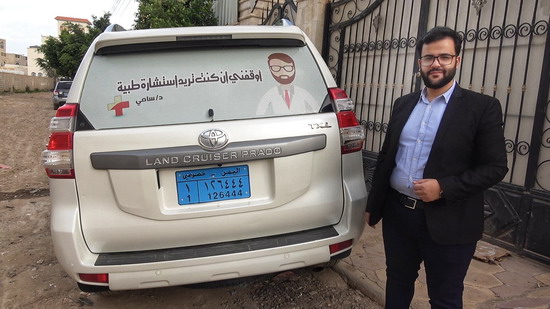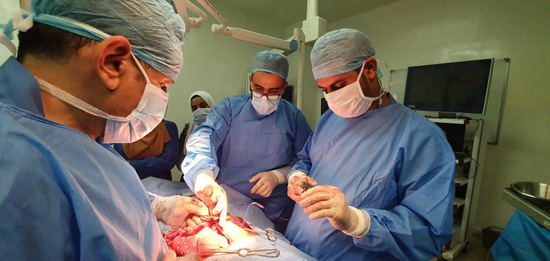 2 July 2020 – Dr Sami Al Hajj is a young doctor working at Science and Technology Hospital in Sana’ where he lives with his pregnant wife. Every day, he puts himself at high risk at his job.
2 July 2020 – Dr Sami Al Hajj is a young doctor working at Science and Technology Hospital in Sana’ where he lives with his pregnant wife. Every day, he puts himself at high risk at his job.
“COVID-19 has left Yemen and health care workers on the frontlines under severe pressure. We put our lives at risk to save the lives of our people. I have seen many doctors fall sick and be admitted to be put on ventilators and monitors, or worse, die. This has been the hardest thing to witness,” he says.
Yet Dr Sami shows no sign of giving up.
“The sensitive health situation in Yemen has made me grow. It made me aware of the magnitude of the needs in Yemen, and of my role to play as a health care worker,” he adds.
We are in this together
As the COVID-19 pandemic emerged in Yemen, Dr Sami received calls and messages from many people on social media worried about the virus and what it meant to them and their families. This made him think of the people working on the streets who don’t have phones or internet and who need medical guidance.
So he decided to start a unique initiative. He printed a poster offering people in the community to stop him for a free consultation if they needed to and placed it at the back of his car.
 “People are scared. Many are unable to stay quarantined due to their financial situation. So they go out to their jobs knowing they are at high risk of infection. I wanted to be closer to them – easier to reach – whenever needed, to discuss a medical issue,” he said.
“People are scared. Many are unable to stay quarantined due to their financial situation. So they go out to their jobs knowing they are at high risk of infection. I wanted to be closer to them – easier to reach – whenever needed, to discuss a medical issue,” he said.
“I was quite surprised at how people reacted to the poster. It made me happy. In the more disadvantaged areas, I would have 30 people stop me in one day.” He adds. “Of course, I am not providing medical services, all I am doing is providing medical consultation services and referring them to the medical facilities where they can access medical support.”
This initiative reminded Dr Sami of the importance of the role health care workers play in the community, especially during a pandemic.
“I understand the fear of health care workers. It is a justified fear given the deteriorating health situation. But our people need us and our experience. I urge myself and fellow doctors to work this out together and to support each other during this challenging time to survive the pandemic.”
The risk COVID-19 poses to Yemen is unparalleled
Since the spread of COVID-19 in December 2019, the pandemic posed an unprecedented impact to health systems worldwide sustaining a dramatic rate of global transmission and spread of cases. The risk it poses to public health in Yemen, however, is unparalleled.
The health situation in Yemen has already been undermined by over 5 years of ongoing conflict and existing vulnerabilities before the war, which have caused extensive damage to the infrastructure and left the health system in Yemen unable to carry the load.
Only half of the health facilities in Yemen are fully functional, and those operating are under severe shortages of essential equipment, supplies and medical staff. Successive infectious disease outbreaks, such as cholera and diphtheria, continue to ravage the country and push more people into vulnerability. High rates of malnutrition among adults in the country is another alarming indicator of the compromised immunity and the vulnerability of the population to infectious diseases. Internally displaced people and refugees are among the most vulnerable due to poor access to sanitation services along with insufficient hygienic practices.
Health care workers need us now more than ever
 As evidenced by this pandemic the health care workforce is the backbone of any health system—these are the unsung heroes.
As evidenced by this pandemic the health care workforce is the backbone of any health system—these are the unsung heroes.
In Yemen, there is a huge lack of skilled health workers. And those who are available are vulnerable: there are no doctors in 18% of districts across the country and most health personnel have not received salaries for at least 2 years. This is in addition to the insufficient number of nurses and midwives coupled with weakened medical health education, unable to fill the deficit in human resources for health, compounded also by the brain drain where the most skilled health professionals have left the country for better opportunities abroad. Based on the existing knowledge of the health care workforce structure in place, medical and paramedical staff lack training on case management, infection prevention and control and use of personal protective equipment to face COVID-19.
The unprecedented financial gap faced under the Yemen Humanitarian Response Plan has led to a fiscal cliff that is threatening the ability to provide a living wage for over 10 000 health care workers who staff Yemen's functioning hospitals and health facilities.
Dr Sami is proof that one person can make a difference. This act of solidarity echoes the message of WHO—the only way we can beat COVID-19 in Yemen is if we do it together.
WHO and aid agencies continue to ramp up COVID-19 response efforts reaching more than 16 million people with awareness-raising activities, and supporting health workers across Yemen with over 227 500 units of personal protective equipment, including gloves, aprons, face shields and masks. In addition, the United Nations has been providing living wages to 9000 frontline health care workers who would otherwise be unable to support their families due to the ongoing conflict.








